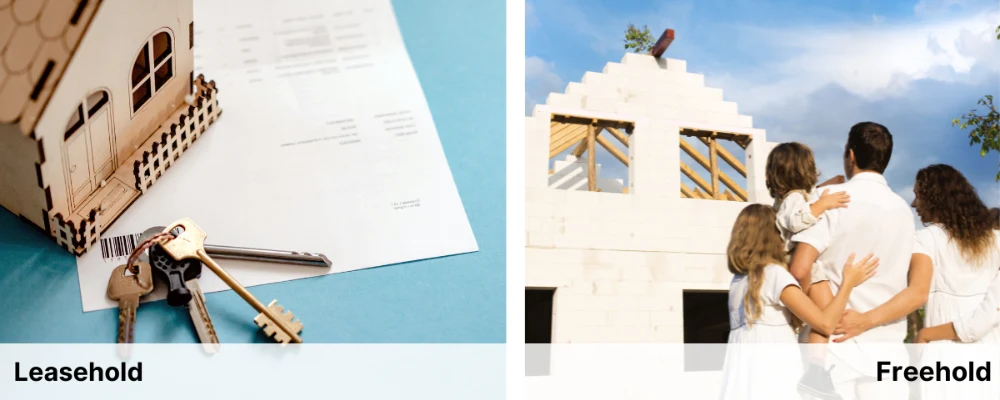When you enter real estate to buy or invest, you will frequently come across the terms leasehold and freehold. These two are different forms of property ownership in India, and it is important to understand the key difference between them before making any decision. These may seem simple, but they carry significant implications for homeowners. In a leasehold property, the lessee can lease the property from the owner for a particular period that has restrictions related to ownership and transfer; meanwhile, freehold property provides complete property ownership without any restrictions on construction transfer and modification. By understanding the difference between these two terms, it can be possible to make an informed decision about investment in real estate.
This blog will provide you with information regarding the differences between leasehold and freehold properties, their advantages and disadvantages in property type, and also the process of converting a leasehold property into a freehold property.

It is a property that the tenant agrees to rent from the owner for an agreed period. It is like having the house for a predetermined time without owning the land. The land will eventually belong to the original owner of the property. For example, most of the flats and apartments you can buy in India as leasehold properties. As a tenant, you need to pay the ground rent, service charges, and maintenance fees to the owner, and you must return the property at the expiry of the lease.
The duration of leaves may differ from 30 to 999 years. If the lease is longer, then the value of the property will be higher. A leased property that has less than 30 years may find it difficult to qualify for a home loan.

What is the Difference Between Freehold and Leasehold Property?
| Name | Leasehold | Freehold |
| Tenure | The lease is generally valid for a fixed period, such as 30, 60, 99, or even 999 years. | The ownership duration is generally permanent but may be subject to limitations by town planning authorities. |
| Approvals Required | Transferring a lease often requires approval from the state or relevant authorities. | There are minimal restrictions on property transfers, making it easier to buy or sell. |
| Ownership Rights | You just have the right to use the property for a specified number of years agreed upon in the lease document. | You own the building as well as the land, with ownership lasting indefinitely. |
Advantages of Leasehold Property
Some of the general advantages of buying leasehold property are,
- Affordable: As it is about only buying the building without land, the purchasing of leaseholds are more affordable compared to freeholds. Depending on the terms and length of the agreement, buying the leasehold can save money, mainly if you want to buy a bigger house in a crowded or influential area.
- Alternative Financial Option: If the agreement allows, you can purchase the entire property, including land, at a lower annual fee compared to a mortgage. but for this, you need an expert to analyse this option in the agreement.
- Becoming a Homeowner: A leasehold is the best way to purchase a house without purchasing its land since you can improve the construction of the building.
Disadvantages of Leasehold Property
There are also some disadvantages to buying the leasehold along with advantages, and they are,
- Continuous Reassessed Rent: The rent of the land can be affordable at the time of agreement, but normally it needs to be reassessed according to the market value of the property. If the real estate market increases, then the ground rent value will become high and unaffordable.
- Higher Down Payment: If you would like to buy a leasehold property with a home loan, then the down payment will be higher than the freehold property.
- Difficulty in Gaining Finance: It will be challenging to get housing finance for freehold properties when compared to freehold.
- No benefit if the land value is increased: As you do not own the land, you will not benefit from increasing land value. The rising price of land in the area is a benefit for the homeowner, and the tenant will end up paying higher rent.
Advantages of Freehold Properties
Some of the advantages of freehold properties are,
- Free from Hold: From the word freehold properties, it can be understood that these properties are free from a hold. That is, you can use the property for any purpose according to the regulations.
- No Time Limit: In the leasehold, we can see that the buyer purchased the property for 99 years, but in the freehold, such properties have no time limit to the ownerships. Once you buy the property, you will become the owner of the property until you transfer it to someone, and its lease will never run out.
- Saving Money on Rent: There is no need to pay any ground rent for freehold property.
- Easy Access to Housing Finance: Home loans will be easily approved for freehold property compared to leasehold property.
- Property Usage as per Discretion: You will be the complete owner of the building and the land, so there is no need to ask anyone’s permission or inform anyone about the changes in the structure of the property you make. You can completely reconstruct the house at your own pace.
- Simple Paperwork: If you wish to sell your freehold house, the paperwork will be simple.
- Easy transfer: If you wish to transfer the property to another person,the process will be much easier than a leasehold of the property.
Disadvantages of Free–Hold Property
- Complete Responsibility of Expenses: As you will be the complete owner of the property, you will be solely responsible for all the expenses related to the property. That includes renovation, repair, reconstruction, and so on. If the property has any legal issues, then it will be your sole responsibility, and the land owner will not share any responsibility.
- Expensive Purchase: If you enter the market for purchasing freehold property, then it will be costly compared to a leasehold house.
How to Choose Between Leasehold Property and Freehold Property?
A few factors need to be considered when making the decision between leasehold and freehold properties.
Ownership extent: According to leasehold, it means that you only own the flat, but the original owner will have the title of the land. Conversely, the freehold property means you get ownership of both land and the building constructed on it.
Unpredictability: As the market fluctuates the least, renewal and ownership will be unpredictable. However, in the freehold on a shape, complete transparency will be given to the land owner.
Rent: In the least world property, the tenant must be annual and rent. There is no such rent applicable on the freehold property.
Maintenance charges: For leasehold property, it is necessary to pay the maintenance charge to maintain the shared facility. In the freehold property, you will be completely responsible for maintenance and related expenses
Lease term: In the leasehold property, the tenant only owns the house for a specific period mentioned in the agreement. However, in freehold property, the owner will have ownership rights forever.
Modification Rights: In the leasehold property, there will be additional formalities that need to be maintained when modifying or reconstructing the house. There are no such limitations in the freehold ownership.
Loan Access: If you want to borrow home loans or mortgage loans for the property, the freehold owner has more advantages compared to the leasehold owner.
Conversion of Leasehold Property into Freehold Property
The main difference between leasehold and freehold properties is that freehold property ownership has multiple advantages over the least-held properties. If you want to convert leasehold property into freehold property, then you must follow some of the steps for converting it into a freehold properly:
- If the property is owned by the government, then apply for conversion from the concerned authority that owns the property.
- If it is a private property, then prepare a sale agreement between both parties.
- By considering the sale, prepare the final deed on the nonjudicial stamp paper.
- Register the final deed with the respective local registrar’s office.
- Mutate the name of the buyer in the local civic body book.
Legal Aspect Regulations
Both the leasehold and freehold systems will operate within the legal framework. Some of the legal aspects and regulations that are involved are:
Rights: The least holders can use and occupy the property within the agreed period and terms. But they need to pay the rent and maintain the property.
Agreements: The agreement is defined as the obligation and rights between both parties, and it specifies the length of the lease, rent payment maintenance responsibility, and so on.
Leasehold Valuation Tribunal: If there are any disputes, then the leasehold valuation tribunal will act as an essential resource that helps determine matters like extension of service charges and so on.
Necessary Documents for Converting Leasehold Property into Freehold Property
For converting the leasehold property into freehold property, there is a need for some specific documents to ensure the legal and smooth process:
- Original Lease Agreement
- No Objection Certificate
- Title Deeds of Property
- Sale Agreement
- Conveyance Deed
- Approval from Local Authority
- Latest Property Tax Receipt
Conclusion
The choice between leasehold property and freehold property ownership is a decision that needs to be considered carefully according to your situation, financial goals, and long-term plans. Each type of ownership has its advantages and disadvantages. Choosing either of them will depend on various factors like the location of the property, budget, and lifetime preferences.,
FAQs
Freehold properties are often considered a better investment because of the security of full ownership.
You can, but they will inherit the property with the remaining lease period.
Yes, freehold properties often appreciate in value, especially in desirable locations. The lack of ground rent and ownership of both the property and the land contribute to this upward trend, making freeholds attractive long-term investments
There are no specific tax benefits, but you avoid the ongoing costs associated with leaseholds.
Yes, the landowner can increase ground rent, typically in line with the lease terms.

